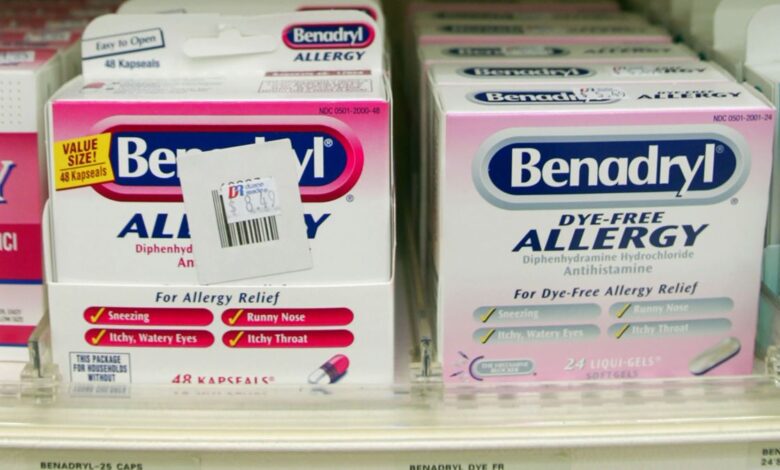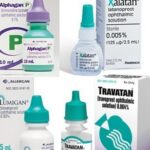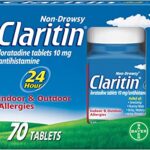Can I Take Expired Benadryl?

Benadryl is a brand of various antihistamine medications used to stop allergies, whose content varies in different countries, but which includes some or no combination of diphenhydramine, acrivastine, and cetirizine. It is sold by Johnson & Johnson. In the United States and Canada, the active ingredient is diphenhydramine. In the United Kingdom, the active ingredients of Benadryl are the antihistamines acrivastine or cetirizine. Some forms of this product has been discontinued or withdrawn for safety or efficacy reasons.
Benadryl is used to relieve allergy symptoms such as sneezing, itching, runny nose, rash, and hives. Some forms of Benadryl are to be taken orally, while some creams and gels are to be applied to the skin. Benadryl is also sold as a cough medicine in Australia and New Zealand containing diphenhydramine, as well as the antitussive dextromethorphan or the expectorant guaifenesin.
This medication works by blocking a certain natural substance (histamine) that your body makes during an allergic reaction. Its drying effects on such symptoms as watery eyes and runny nose are caused by blocking another natural substance made by your body (acetylcholine).
How should this medicine be used?
Diphenhydramine comes as a tablet, a rapidly disintegrating (dissolving) tablet, a capsule, a liquid-filled capsule, a dissolving strip, powder, and a liquid to take by mouth. When diphenhydramine is used for the relief of allergies, cold, and cough symptoms, it is usually taken every 4 to 6 hours. When diphenhydramine is used to treat motion sickness, it is usually taken 30 minutes before departure and, if needed, before meals and at bedtime. When diphenhydramine is used to treat insomnia, it is taken at bedtime (30 minutes before planned sleep). When diphenhydramine is used to treat abnormal movements, it is usually taken three times a day at first and then taken 4 times a day. Follow the directions on the package or on your prescription label carefully, and ask your doctor or pharmacist to explain any part you do not understand. Take diphenhydramine exactly as directed. Do not take more or less of it or take it more often than prescribed by your doctor or directed on the label.
Does Benadryl Expire?
Yes, Benadryl can expire. An expiration date is a date after which a consumable product such as food or medicine should not be used because it may be spoiled, damaged, or ineffective. Expiration dates are especially important for medications because they offer the only indication about whether the product is still safe to use
In the late 1970s, the United States Food and Drug Administration (FDA) mandated that all prescription and over-the-counter (OTC) medical products contain an expiration date. Expiration dates for medicines are often marked “EXP” and are printed on the label or stamped onto the medicine bottle or box.
Can I take expired Benadryl?
No, expired Benadryl is less effective or risky due to a change in chemical composition or a decrease in strength. The expiration date is the final day that the manufacturer guarantees the full potency and safety of a medication. Drug expiration dates exist on most medication labels, including prescription, over-the-counter (OTC) and dietary (herbal) supplements. U.S. pharmaceutical manufacturers are required by law to place expiration dates on prescription products prior to marketing.
Certain expired medications are at risk of bacterial growth and a sub-potent Benadryl can fail to stop allergies, leading to more serious illnesses. Once the expiration date has passed there is no guarantee that the medicine will be safe and effective. If your Benadryl has expired, do not use it. Even though some controversial studies indicate that some drugs can be used after expiry dates, it is better to err on the side of caution in order not to complicate your health condition or trigger unwanted adverse effects.
Common side effects of Benadryl include:
• drowsiness,
• fatigue,
• tiredness,
• sleepiness,
• dizziness,
• disturbed coordination,
• constipation,
• dry mouth/nose/throat,
• difficulty urinating or an enlarged prostate,
• upset stomach,
• blurred vision,
• double vision,
• tremor,
• loss of appetite,
• headache, or
• nausea.
Expired Benadryl may still interact with monoamine oxidase inhibitors (MAOIs), other over-the-counter cough, cold, allergy, or insomnia medications, anxiety or sleep medicines, antidepressants, or any other medications that make you feel drowsy, sleepy, or relaxed.
What to do with expired Benadryl?
The CDC reports that 50,000 young children end up in emergency rooms each year because they got into medicines while an adult wasn’t looking. Expired medicines are also not just a risk to the person they were prescribed for and can injure children and pets if taken by mistake. For all these reasons, proper disposal of unneeded medicines is essential.
Keep this medication in the container it came in, tightly closed, and out of reach of children. Store it at room temperature and away from excess light, heat and moisture (not in the bathroom).
It is important to keep all medication out of sight and reach of children as many containers (such as weekly pill minders and those for eye drops, creams, patches, and inhalers) are not child-resistant and young children can open them easily. To protect young children from poisoning, always lock safety caps and immediately place the medication in a safe location – one that is up and away and out of their sight and reach. http://www.upandaway.org
Unneeded medications should be disposed of in special ways to ensure that pets, children, and other people cannot consume them. However, you should not flush this medication down the toilet. Instead, the best way to dispose of your medication is through a medicine take-back program. Talk to your pharmacist or contact your local garbage/recycling department to learn about take-back programs in your community. See the FDA’s Safe Disposal of Medicines website (http://goo.gl/c4Rm4p) for more information if you do not have access to a take-back program.
A place for everything
Proper storage is one way to help make sure your medicines will remain safe and effective up to their expiration date. Be sure to read the label to see if there are specific storage instructions for your medicine. Certain medicines need to be stored in the refrigerator and others cannot be exposed to high temperatures. Improper storage – such as a damp bathroom cabinet – can contribute to decreased effectiveness in medicines that have not reached their posted expiration date. For most medicines, to help ensure the proper shelf life of your medicine, it is better to store medicine in a cool, dry place such as a dresser drawer, storage box, closet shelf, or kitchen cabinet.
When storing medicine in a kitchen cabinet, make sure that it is away from hot appliances and the sink due to changing temperatures and humidity which can affect the medicine. When storing medicine in a high traffic area like a kitchen, care should be taken to prevent access by children at risk of accidental poisoning or others who may be tempted to take for abuse/misuse.
Remember to store medicines properly and don’t use expired medicines, it’s not worth the risk!





